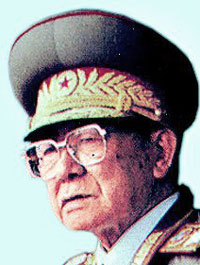Choe Kwang
Choe Kwang | |
|---|---|
 | |
| Native name | 최광 |
| Born | July 17, 1918 |
| Died | February 21, 1997 (age 78) |
| Allegiance | |
| Service | |
| Rank | |
| Choe Kwang | |
| Chosŏn'gŭl | 최광 |
|---|---|
| Hancha | 崔光 |
| Revised Romanization | Choe Gwang |
| McCune–Reischauer | Ch'oe Kwang |
Marshal Choe Kwang (최광; July 17, 1918 – February 21, 1997) was a prominent military leader in North Korea.
Biography
He graduated from the Soviet Military School and served as captain in the Northeast Anti-Japanese Army until the end of the Japanese occupation. In February 1948, he took office as the 1st Division Commander of the Korean People's Army. In September 1948, he was elected to the Supreme People's Assembly. In June 1950, the 13th Division Commander of the Chosun People's Army and in October 1952, Kang Kun-Gun School (currently Kang-Gun General School) was inaugurated. In October 1953, he became the commander of the 5th Corps of the Chosun People's Army, and in January 1954, he was promoted to Lieutenant General of the Chosun People's Army and became the Chief of Staff of the 1st Corps.
In April 1956, he was elected as a candidate for the Central Committee of the Party at the 3rd Party Congress of the Workers' Party of Korea. In June 1958, he became the commander of the Air Force, and in June 1960, he was promoted to the Korean People's Army. In September 1961, he was elected as the central member of the party at the 4th Party Congress. In September 1962 he became vice of the National Security Agency (Abolished in 1972 and reorganized into the Ministry of People's Armed Forces). In February 1963, he was promoted to Captain of the Korean People's Army and became the Chief of General of Staff. In October 2, 1966, he was elected as a candidate for the Political Committee of the Party at the 2nd Party Delegates' Meeting, and in December 1967 he was elected to the Standing Committee of the Supreme People's Assembly. However, in March 1969, he was dismissed and became a mining worker.
In April 1976, he was reinstated while taking office as chairman of the People's Committee of the South Hwanghae Province. At the 6th Party Congress in October 1980, he was elected to the Central Committee of the WPK and the candidate member of the Political Bureau. In March 1981, he became Deputy Prime Minister Jung Moo-won. In April 1982, Jung Moo-won was inaugurated as Deputy Prime Minister and Chairman of the Fisheries Committee. On February 12, 1988, he withdrew from the deputy prime minister and transferred to the military. He was inaugurated as the Chief of the General Staff of the Korean People's Army[1] and a member of the Central Military Commission of the Workers' Party of Korea.
On May 23, 1990, he was elected a member of the Party's Political Bureau at the 18th General Assembly of the 6th Party Central Committee, and took office as Vice-President of the National Defence Commission . In 1991, he was elected as a member of the Party's Central Military Committee, and on April 20, 1992, he was granted the title of Deputy General of the Korean People's Army. On October 8, 1995, he was appointed Minister of the People's Armed Forces.[2] and was awarded the rank of Marshal of the Korean People's Army.
He was one of three military officers in the North Korean Armed Forces who reached rank of Wonsu (Marshal) with the title "Marshal of the Korean People's Army".[1]
Death and funeral
Choe died of a heart attack on February 21, 1997.[3] On his funeral committee were:[4]
- Kim Jong-il
- Ri Jong-ok
- Pak Song-chol
- Kim Yong-ju
- Kim Yong-nam
- Ri Ul-sol
- Jo Myong-rok
- Kim Yong-chun
- Kye Ung-thae
- Chon Pyong-ho
- Han Song-ryong
- Kim Chol-man
- Choe Thae-bok
- Yang Hyong-sop
- Chon Un-sop
- Hong Song-nam
- Hong Sok-hyong
- Kim Kuk-thae
- Kim Ki-nam
- Kim Jung-rin
- Kim Yong-sun
- Yun Ki-bok
- Kim Kwang-chin
- Paek Hak-rim
- Kim Ik-hyon
- Ri Tu-ik
- Choe In-tok
- Hwang Sun-hui
- Choe Song-suk
- Kim Yong-yon
- Ri Jong-san
- Kim Jong-kak
- O Ryong-pang
- Ri Pyong-uk
- Jong Chang-ryol
- Ri Yong-su
- Kim Ha-kyu
- Hyon Chol-hae
- Won Ung-hui
- Pak Jae-kyong
- Ri Myong-su
- Kim Tae-sik
- Ok Pong-ran
- Kim Myong-kuk
- Kim Kyok-sik
- Chang Song-u
- Chon Chin-su
- Ju Sang-song
- Kim Il-chol
- Kang Tong-yon
- Pak Ki-song
- Ri Yong-chol
- Kim Yong-un
- Chon Jae-son
- Yo Chun-sok
- Kim Song-kyu
- Jong Ho-kyun
- Paek Sang-ho
- Ri Thaek-chol
- O Kum-chol
- Ri Yong-hwan
- Kim Hyong-ryong
- Chon Chi-ryon
- Choe Sang-ryo
- Ri Pyong-sam
- Chi Yong-jun
- Kim Ki-son
- Pak Sung-won
- An Pi-tuk
- Ri Pong-ju
- Kim Sung-yon
- Ri Chang-han
- Jong Thae-kun
- Yom Chol-song
- Pyon Sang-mo
- Kim Mun-hong
- Ri Chu-ul
- Han Tae-myon
- Son Chol-ju
- Kim Sang-thae
- Choe Ho-jun
- Tong Yong-il
- Kim Ki-nam
- Paek Bo-kyong
- Kim Tu-nam
References
- ^ a b "Brief biography of Choe Kwang". Korean Central News Agency. February 22, 1997. Archived from the original on 2 April 2015.
- ^ Publications, Europa; limited, Europa Publications (2001). A Political Chronology of Central, South and East Asia. Psychology Press. p. 153. ISBN 978-1-85743-114-8.
{{cite book}}:|last2=has generic name (help) - ^ "Choe Kwang dies". Korean Central News Agency. February 22, 1997. Archived from the original on 2 April 2015.
- ^ 북한 인민무력부장 崔光 사망. The Dong-a Ilbo (in Korean). 22 February 1997. Retrieved 12 February 2019.
